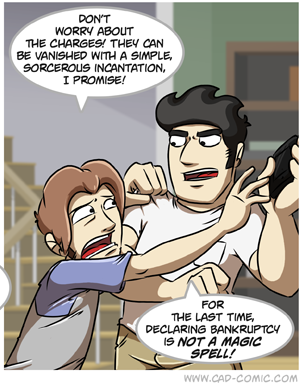I got talked into bankruptcy (by a bankruptcy lawyer, surprise surprise). It cleared $12k of credit cards and bank fees but not the then-$50k of student loans and the spending habits that were the real problem. Now I learned my lesson. No credit cards. Save up and pay. Have an emergency fund that can cover your expenses for months and months in the event you lose your job, or your most expensive unplanned repair. That’s the real life saver.
Credit cards are fine for people who can control their spending. I never pay interest, so I get my rewards for free and am building my credit. If you cannot control your spending habits, you might consider a card with a low limit.
You mean you never pay interest by paying off the debt before the next billing cycle, right? Or is it fine to get zero interest for whatever amount of months on certain purchases?
We do both… both are fine. As long as you aren’t paying fees or interest, there is no disadvantage to using credit cards.
Ah, okay, I always figured the only way to really be responsible with credit was to use credit cards like debit, but if a big purchase came along that I definitely couldn’t pay off within the month, I figured it wouldn’t hurt to have zero interest but wasn’t sure of the impact on my credit.
That is pretty much the right way to do credit. Treat like debit and/or find a way to have 0% interest over a few months time to spread a big cost across multiple months where it becomes affordable.
My concern is the impact on my credit from not paying back in full, even if there’s zero interest for an extended period of time. Like paying an appliance in 3 months with no interest versus the full balance before the next billing cycle. I just assume there’s a downside to having that convenience aside from them hoping I’ll fall behind.
Personally, I pay off before next billing cycle. However, I have been fortunate with my finances. I know friends of mine who carry credit card debt, and they have successfully managed to balance transfer from one card to another using periodic balance transfer deals that let you transfer all your debt from one credit card to another with a 0% interest rate for 12 months or so. They have managed to do this for years.
So there are definitely a variety of options!
I used to feel this way with 2% cash back, but I don’t think it’s worth the privacy loss of giving a for-profit corporation all of my spending data. Where I live now, almost no one accepts credit cards in person & if they do, there’s a high minimum payment & you will be paying the transaction fee. After getting used to carrying cash again, I can confidently say I prefer the anonymity. What weirder in hindsight is many other places either not accepting cash or baking the credit fees into the prices so it’s cash payers getting screwed—meanwhile the credit companies get to skim fixed costs while providing minimal value.
Yes, you definitely need to be vigilant these days about the fees. A lot of places are passing the costs to customers or offering lower prices for cash and debit.
In France after high school you pay 170€ the first 3 years the 243€ the next two, 100€ more each year if you don’t have aides from the government. Some engineering schools (~600€) or private schools are more expensive.
That’s a total of 1496€ for a 5y curriculum at most, if you don’t have any aides. (810€ for a shorter 3y one)
For reference the monthly minimum wage is 1398.69€ (without tax).
So if you work two months at McDonald’s you can literally pay your entire education with enough room to spare if you didn’t pass some years.
(Engineering schools is more but it isn’t crazy either)
That’s without any help, but we have some cheap apartment specifically for students, help to pay the rent. And in addition to this you can get a sizable amount depending on the income of the parents, sometimes enough to live on.
So why in the hell would you pay 50k. That’s 33 times as much, guys just come to France, or the EU and your set lol
Everything you’ve said only stands for public university (which is better than private schools however). In the private world, you’re looking at ~10000€ a year.
So why in the hell would you pay 50k. That’s 33 times as much, guys just come to France
I believe it’s more expensive for foreigners to study in France now. You’re looking at ~3000€ per year IIRC.
Ho yes you’re right!
It used to be the same but they increased it in 2019. They passed a reform with a lot of changes to the whole education system (including high school which add a lot of changes).
The reform was pretty bad for a lots of reasons.
Should have thought of it, every university went on strikes for it, including mine (I was just on year 1).
They passed it anyway…
So yes now its 2770€ for the first 3y and 3770€ the next 2. Granted that’s still cheaper, 15,850€ total but that’s only 3 times more expensive, not as crazy.
P.S. Private school can be good especially in some fields, but they’re also a bit prestigious too. And 10k is a pretty good approximate i believe.
The real cost is in living expenses though. A lot of kids still end up with 20-40k of loans after 3-5 years in school living on their own.
Sure, most people i know either have parents to help them, including some fund they made them, or get the aides for students (including cheaper and small apartment, help to pay the rent, cheap meal at campus and scholarship). Some have a mix of both like me.
It’s often a bit short anyway, it isn’t luxurious, but we deal with it, i never met someone that took a loan as a solution though.
But we still have living expenses in the US too, on top of the outrageous tuition costs. My bachelor’s degree cost $58,000 but during those 4 years I also worked two jobs just to pay for rent and food and keep my car working. I’ve been out of college for over 10 years btw and still owe $40k in student loans.
How has bankruptcy affected you when you’ve gone to apply for things? Has there been any real long term effects when you apply for like a house or car loan?
I was able to get a car loan a few years after the bankruptcy. It was dumb, I hadn’t fully figured out my money situation yet. Bankruptcy didn’t fix that spending habit. But that was the tipping point. When my minimum expenses between the car, student loans, and living expenses exactly equaled my salary, I started trying to beat my way out of the mess. The car I currently own, I paid for up front. By the time I bought a house, the bankruptcy had disappeared off my report. Now the plan is pay off the mortgage and never have a credit score again.
Bankruptcies fall off your credit report after 7 years. I think the only thing you are blacklisted from after that 7 year period is the bank that credited you and lost money.
Imagine being inside a month😵💫
🥵
July is hot, what’s your problem?
We’re inside the month filling the bankruptcy
“I declare BANKRUPTCY!!!”
filling for bankruptcy
inside a month
Go back to school

deleted by creator
Why don’t you just not buy a credit card? Or do you need it to have a credit score?
well at this point he’s 50 years old and he’s paying off a bunch of credit cards. I think you’re supposed to be giving that advice to 18-year-old him. Not 50-year-old him.
I see bender (over drake) i hit up like
Student Loans have entered the chat.
Useless endeavor if the individual in question doesn’t change their spending habits. Be right back fucked again in a few years.
Filing for bankruptcy is offloading your responsibility to others who then have to pay with their money for your faults.
It’s a cheap way out for people that do not act responsibly.
Bankruptcy? Okay, but then lose all saying in your money spending because you just proved you can’t handle it yourself.
you do realize that bankruptcy does have consequences, right? for one, it’s nearly impossible to find a new place to live if you’ve ever declared bankruptcy. If you work in certain sectors, you can lose your job. if you’re a government worker, you’d lose your security clearance or probably even a public trust. If you lose your job, new companies that might hire you would likely do a credit check for some reason and find you unqualified because of that bankruptcy.
So it’s double-triple bad to have debt? Then manage the finances, assess the risks, cut unrealistic expectations that will toss you into the debt spiral, because it’s triple-bad. Who is to blame?
Poor banks :( The irresponsible poors need to do things the right way, and lobby congress to bail them out.
The average credit card interest rate is 25%. Yes people shouldn’t borrow money they can’t pay back. However that doesn’t change the fact that interest rates on credit cards are wildly high and entrap people in a loop of only paying the interest off. Bankruptcy is their only hope of escape from that debt cycle.
Can you please explain briefly plz bro. I know pretty much nothing about bankruptcy.
People “spend irresponsibly” for a ton of reasons like medical expenses, paying for a funeral, having mental illnesses that they don’t even know about, etc. Life happens.
They received money from a rich guy or corporation who knows of the risk of their money going “poof.” Creditors aren’t mom-and-pop shops, and they will survive if an investment doesn’t go well. The same cannot be said for the person in deep credit card debt. Oftentimes, the lenders are the ones who have predatory practices and purposefully make it easier for peoples’ debt to spiral out of control, and you shouldn’t feel bad for those lenders.
About these unexpected costs:
-
medical insurance is a must, otherwise you are gambling and the chances to lose this bet are quite high.
-
funerals happen unexpected - when they actually absolutely do not. Everybody can be sure to die, so plan accordingly.
-
being “in deep credit card debt” is too late. One should never have swam out this far. Being “a tiny little bit in debt” should have the alarm bells blasting as financing is not self sustaining, “a tiny litte bit” is already much too late already because you’ve entered the spiral
-
student debts - well, not everybody has to study. If you can’t afford it reflect on it, if you really must. And if yes, seek alternatives like leaving the country tht is hell-bent to enslave you in debt if you want to study, find sponsors, arrange it with your expectations about a longer time horizon, etc. You are not able to pay for it? Do not do it! Seek solutions.
medical insurance is a must, otherwise you are gambling and the chances to lose this bet are quite high.
You can still have deep medical debt with good insurance. Saying otherwise is incredibly wrong and out of touch. This also ignores how good insurance is inaccessible to a good chunk of the population.
funerals happen unexpected - when they actually absolutely do not. Everybody can be sure to die, so plan accordingly.
Explain how someone who has 0 room in their budget after food, rent, and utilities can plan for the costs of a sudden death. The situation I described is incredibly common in America.
- being “in deep credit card debt” is too late. One should never have swam out this far. Being “a tiny little bit in debt” should have the alarm bells blasting as financing is not self sustaining, “a tiny litte bit” is already much too late already because you’ve entered the spiral
Please explain how to avoid credit card debt when basic necessities cannot be obtained with the income you have. Assume that you can’t get a 2nd job because of child or eldercare duties.
- student debts - well, not everybody has to study. If you can’t afford it reflect on it, if you really must. And if yes, seek alternatives like leaving the country tht is hell-bent to enslave you in debt if you want to study, find sponsors, arrange it with your expectations about a longer time horizon, etc. You are not able to pay for it? Do not do it! Seek solutions.
This would leave college inaccessible to the vast majority of students, especially from lower income families. Not going to college isn’t a solution when well-paying jobs require college degrees.
Your “solutions” in 2024 are essentially blaming lower-income individuals for being lower income individuals. Oftentimes, these lower-income individuals are lower-income because they were born into lower-income families and had fewer opportunities to become wealthy as a result. In 2024, basic necessities are inaccessible to many Americans because their wages aren’t high enough to meet the rising costs of these basic necessities. Their choice is to either suffer without basic needs and be able to afford less and less because their wages remain stagnant or to make poor financial choices to be able to live. Yes, the US has safety-net programs to help lower-income individuals gain more opportunities. No, these programs are not enough because they are underfunded, and the funds allocated to them are mishandled. No, it is not easy for individuals to get out of deep poverty. No, “don’t make even a single financial mistake in your life or you’ll suffer for 70+ years” is not a solution.
-
It’s irresponsible for banks to loan money, they pay many people salaries for risk assessment before loaning it. Also their loan is insured so even if you don’t pay it back they write the loss off.
Indeed. But they want to make money, so they rise the interest rate to make even more money and cut losses on failed debt repayments.
They solely exist to make money by extorting the people in debt. Who would have guessed?
So? Never have debts.
“Consumer” debts should ethically not exist as consumers just consume the money and are therefore not able to pay it back as it is not an “investment” debt, which has the chance to succeed.












